Eber’s water towers – Denmark
The leading trade journal in Sweden, VA-tidskriften Cirkulation has since 1998 an article series under the heading Ebers vattentorn (Eber’s water towers), where Eber Ohlsson with text and photo presents interesting water towers in the world (except Scania and Sweden). Below is a free translation to English of these texts.
Eber’s water towers in Cirkulation 8/2023
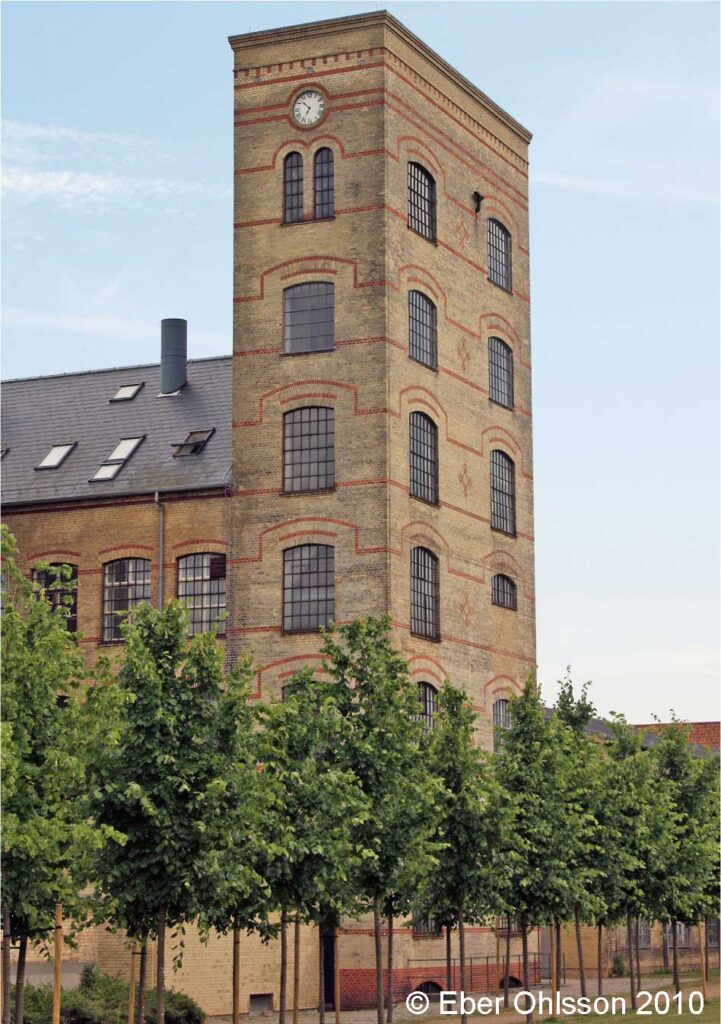
A free translation to English:
The small river Mølleåen north of Copenhagen is Denmark’s industrial cradle, and since 2007 a national industrial memory. At one of the small river’s dams was created Brede Værk, where there the first 200 years was carried on copper processing and then in 124 years textile production.
Textiles fires can be extinguished quickly and automatically with a sprinkler system in combination with the extinguishing agent water. Denmark’s first sprinkler system from 1894 was at Brede Værk linked to two water tanks on top of the highest building, where a tower clock painted on the outside shows eternal time. Brede Værk now belongs to the National Museum, which has a museum branch here.
Published 2023-12-13
Eber’s water towers in Cirkulation 8/2022
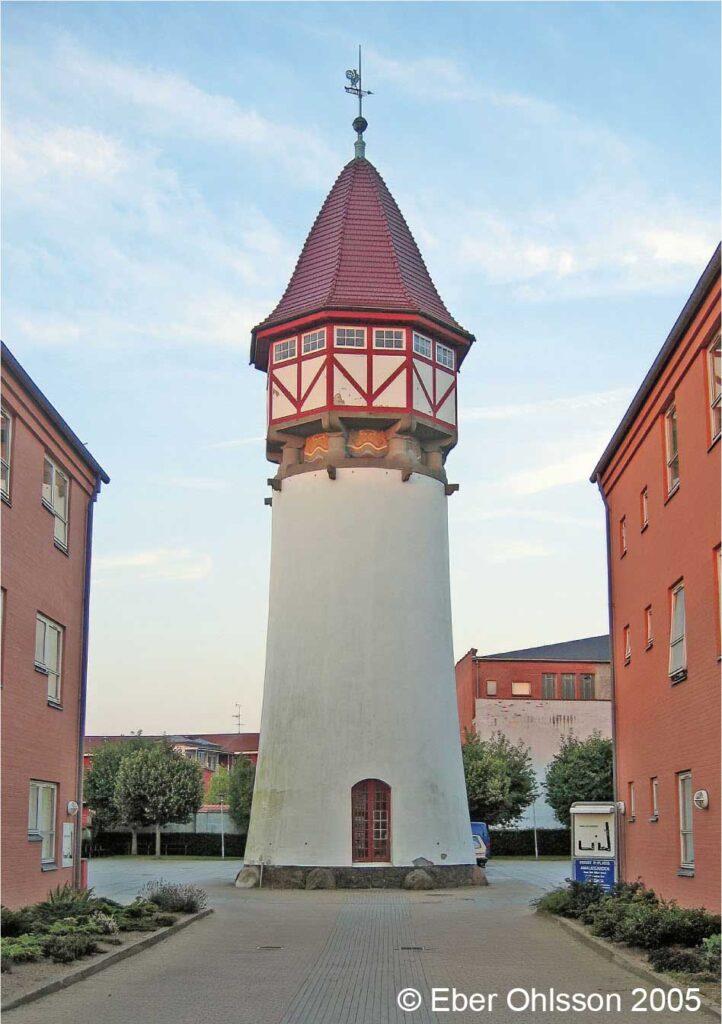
A free translation to English:
A humble water supply in the young Jylland town of Silkeborg meant that the insurance companies demanded high fire insurance premiums for the city’s textile industry. The successful textile factory C. Commichau & Co then judged that it would be more advantageous to both arrange their own water supply and build their own water tower.
In 1902 they therefore built, over a 40 m deep well, a 15.5 m high water tower in reinforced concrete with a reservoir of 23.5 m3 designed by architect Arnold Rosen in historic style. In the 1980s Silkeborg municipality restored the tower and in 1986 it became a building memory.
Published 2022-12-14
Eber’s water towers in Cirkulation 8/2021
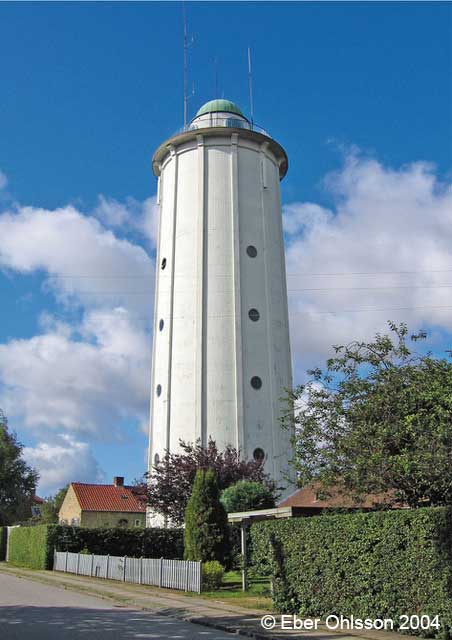
A free translation to English:
When architects are to draw a building, it is not unusual for them to be inspired by older buildings. Like that it was when Hvidovre water tower was to be built. Hvidovre is a southwestern suburb of Copenhagen, which got municipal waterwork and water tower in the 1930s.
The architect Carl Jørgensen had when he designed the 36 meter high water tower with a reservoir of 300m3 and which was completed in 1937, the Rundetårn in Copenhagen as a model. Like King Christian 4’s famous and equally high observatory tower from 1642 in inner Copenhagen, it has pilasters and viewing platform, but in modern functional style.
Published 2021-12-08
Eber’s water towers in Cirkulation 8/2020
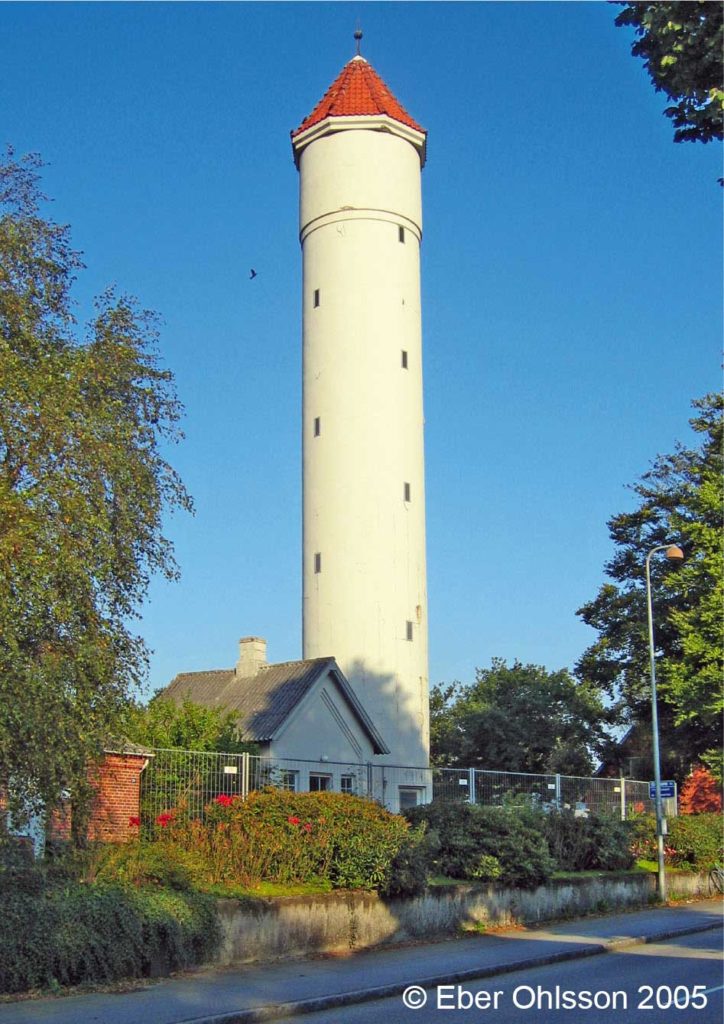
In modern Danish “øl” stand for “beer”, “god” stand for “good” and “gud” stand for “god”.
A free translation to English:
Ølgod is a Danish society in West Jutland. The word “øl” is an old Danish word for “sanctuary” and the word “god” [gud] stand for “god”. “Ølgod” does not mean good beer, even if beer is worshiped in Denmark. In this station community, a 28 meter high water tower was constructed in reinforced concrete in 1914, designed by the well known water tower designer G. R. Øllegaard.
The tower, which was popularly called “The upright pipe”, was taken out of operation in 1971. After renovation in 1990, it was transferred to the Ølgod Museum. The association “Friends of the Water Tower” secures its future, a tower that became Ølgod’s official mark when it turned 100 years.
Published 2020-12-09
Eber’s water towers in Cirkulation 8/2019
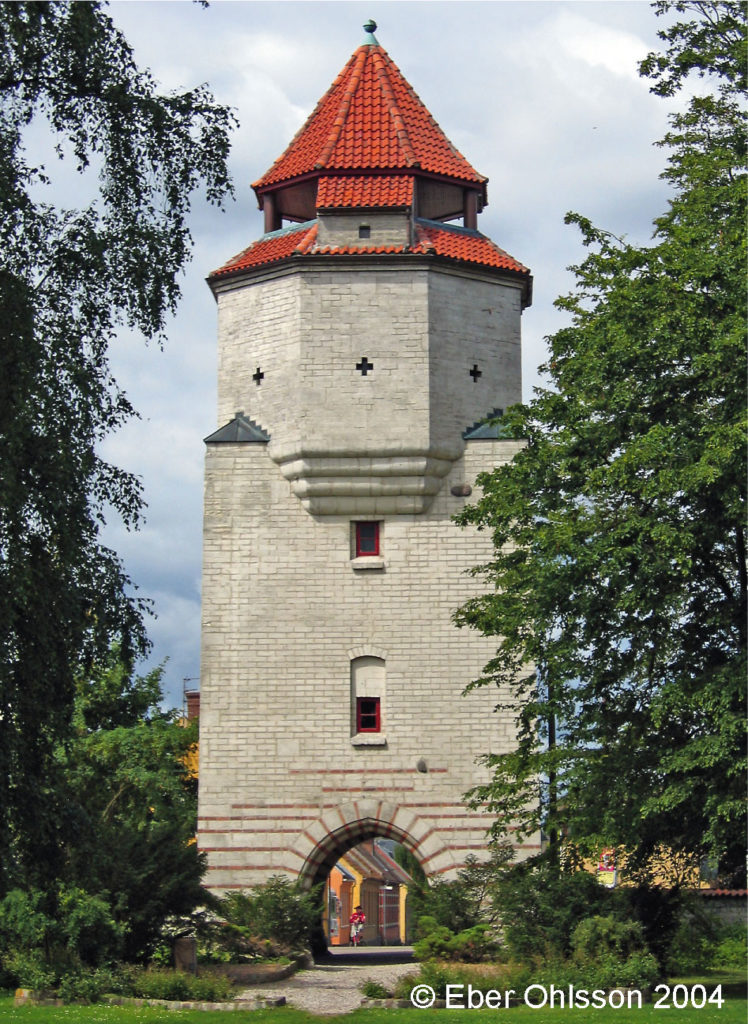
A free translation to English:
Medieval city walls confined, protected and marked their cities, but there were even gate towers at strategic places for entry and exit. In later centuries, much of it was demolished when the cities expanded. Gate towers, however, in some cases has returned, when architects have attempted to shape it so that the new water tower fit in an older urban form.
In Store Heddinge on Zealand in Denmark, the architect GB Hagen designed an 18 m high water tower as a gate tower. It was built in 1911 with chalk from the nearby Stevns Klint and has hints of red bricks and a coat of arms on the facade.
Published 2019-12-11
Eber’s water towers in Cirkulation 8/2018
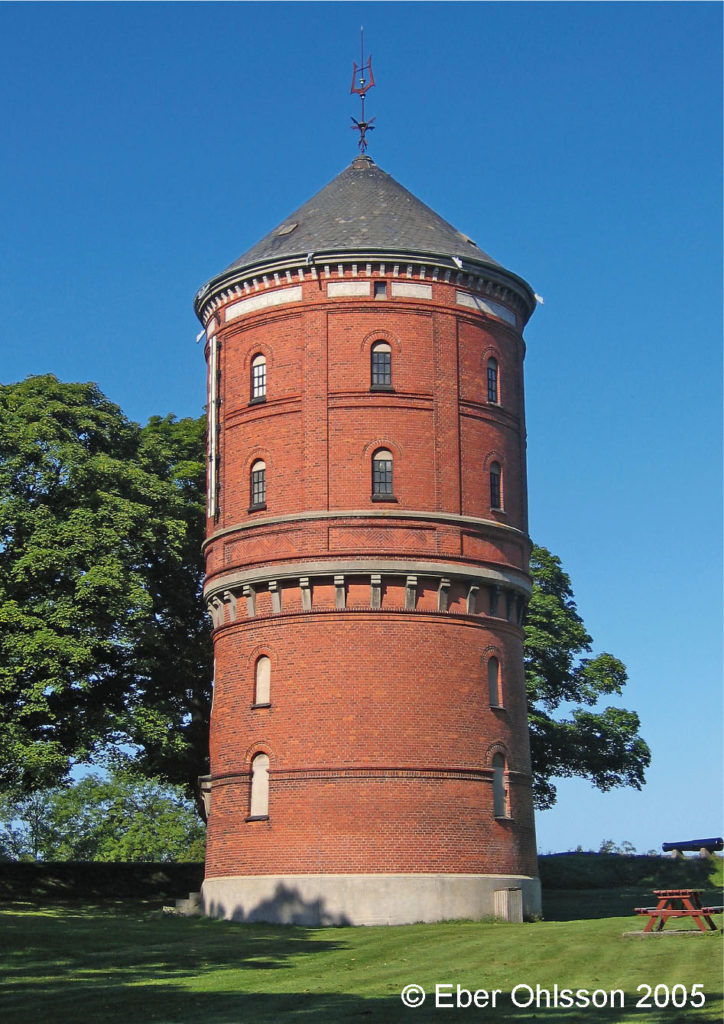
A free translation to English:
There are many parameters that influence the choice of location when a water tower shall be built. One is if you already have an elevation near the consumers, because in that case, it will reduce the construction cost, as if the land is already in public ownership. Therefore, one also finds several water towers on the fortification land.
Such height is Dronningens [the Queens] bastion in the city Nyborg Renaissance fortification. Here, on the Danish island of Funen’s east coast was there in 1899 therefore built a water tower in brick, barely 23 meters high and designed by architect Emil Swanenflügel. The water tower, with a water level indicator on the facade, is since 1997 a listed building.
Published 2018-12-05
Eber’s water towers in Cirkulation 8/2017
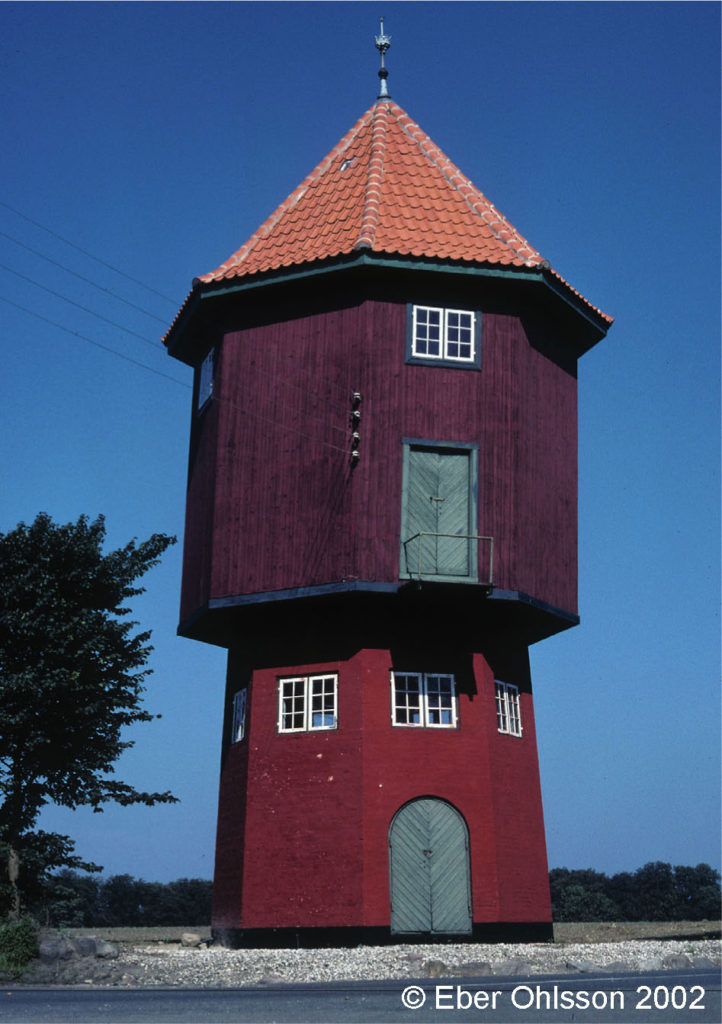
A free translation to English:
A water tower which is built by a tea and coffee importer could indicate that water is a key ingredient in the preparation of these stimulants. It is known that the hardness of the water affects the quality of the beverages, and it is not without reason that coffee companies providing Skånerost [Scania roast], even if the water that comes in the Scanian municipal water supply systems now have lower hardness.
Wholesaler Christian Fode bought in 1918 Orebjerg Estate in Danish Zealand and modernized the estate, including power and water utilities. Up at the road he built also a 13-meter high water tower.
Published 2017-12-13
Eber’s water towers in Cirkulation 8/2016
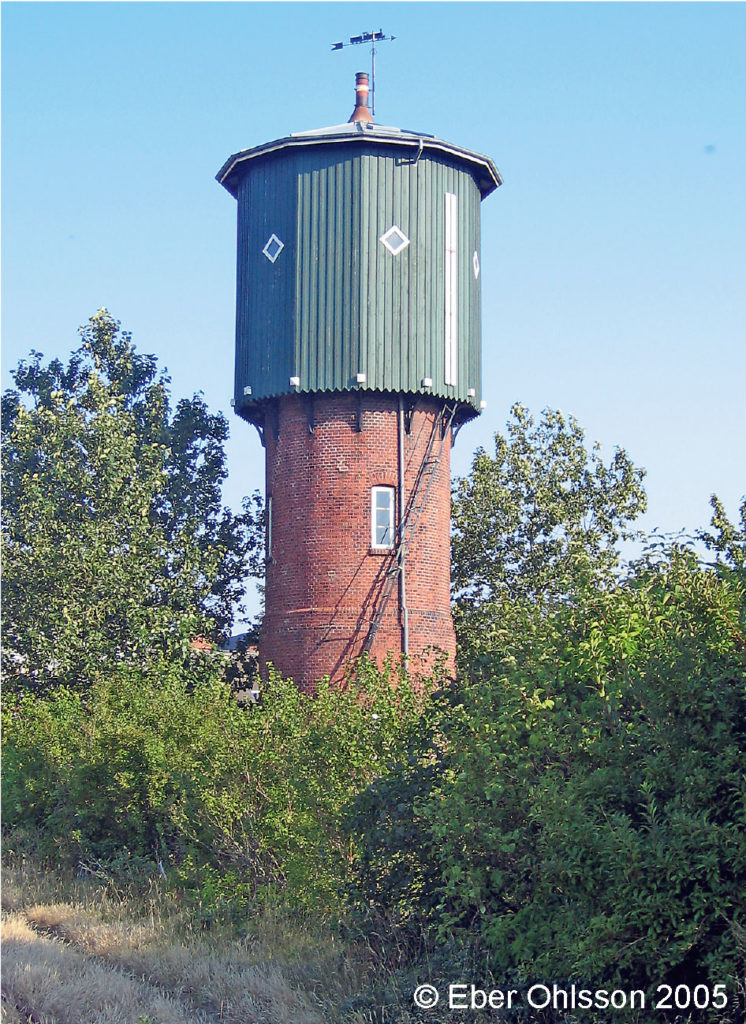
A free translation to English:
The city Skjern in Danish Western Jutland is created by the railway. Here stands since 1898 a 15 m high water tower for supply to the steam engines. It is designed by NPC Holsø, one of Denmark’s leading railway architects. The tower is listed building since 1981.
Skjern, located in a Free Church area, was once an alcohol dry area. But there was a watering hole. At the railway restaurant could thirst quenched, but only if you had a train ticket. Therefore, it was sold many tickets to the closest station – Tarm 4 km away. The number of persons that really traveled between the stations was considerably less.
Published 2016-12-07
Eber’s water towers in Cirkulation 8/2015
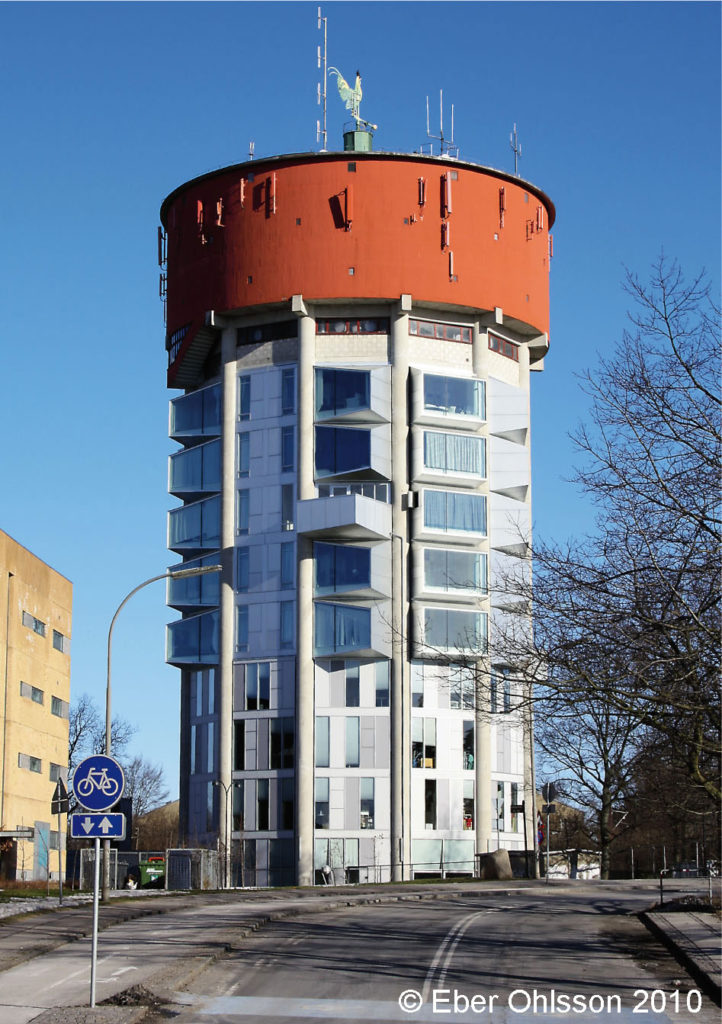
A free translation to English:
Weathervanes as church roosters are not uncommon, so why could not such rooster also be on a water tower? What it does on the tower in Danish Jægersborg, north of Copenhagen. It is easy to observe, since the tower is the aim for those traveling on the highway south to the Danish capital.
The tower, built in 1955, is designed by architect Edward Thomsen. In recent years, it has set up recreational facilities in the tower’s lower floors and 36 youth apartments on the levels under the reservoir. The architect Dorte Mandrup is here with the light window constructions faceted the tower.
Published 2015-12-09
Eber’s water towers in Cirkulation 8/2014
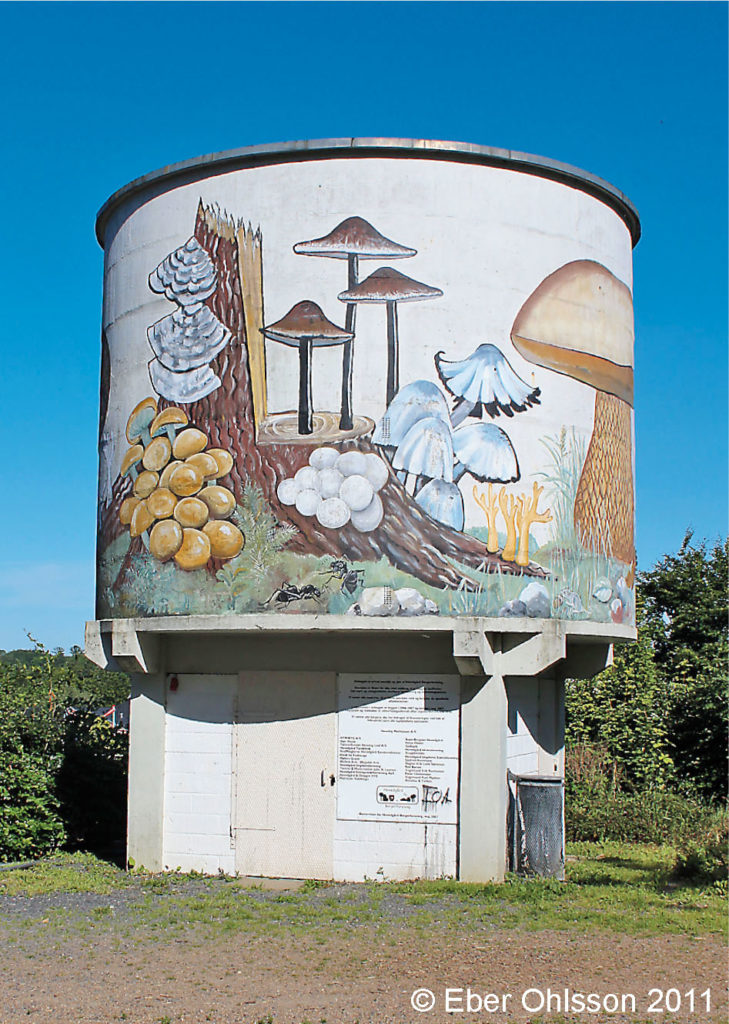
In Swedish, the word ”svampen” means ”the mushroom”. The first water tower in the world with prestressed concrete that got mushroom shape was built in the city of Örebro in Sweden. It is now called ”Svampen”.
A free translation to English:
If you say mushroom water towers, will most of the people see at their inner eye a water tower like ”Svampen” in Örebro, or its many imitators. These towers also have an ideal shape, volume on top for even pressure and small volume at the bottom where water turnover may be less. A shape that became possible to build when prestressed concrete became part of the construction.
In the Danish Hovedgård, a small community between Horsens and Århus, stand a different mushroom water tower. A simple small water tower from the 1930s that has mushrooms of all kinds painted on the facade. A mushroom place that it is easy to find.
Published 2014-12-10
Eber’s water towers in Cirkulation 8/2013
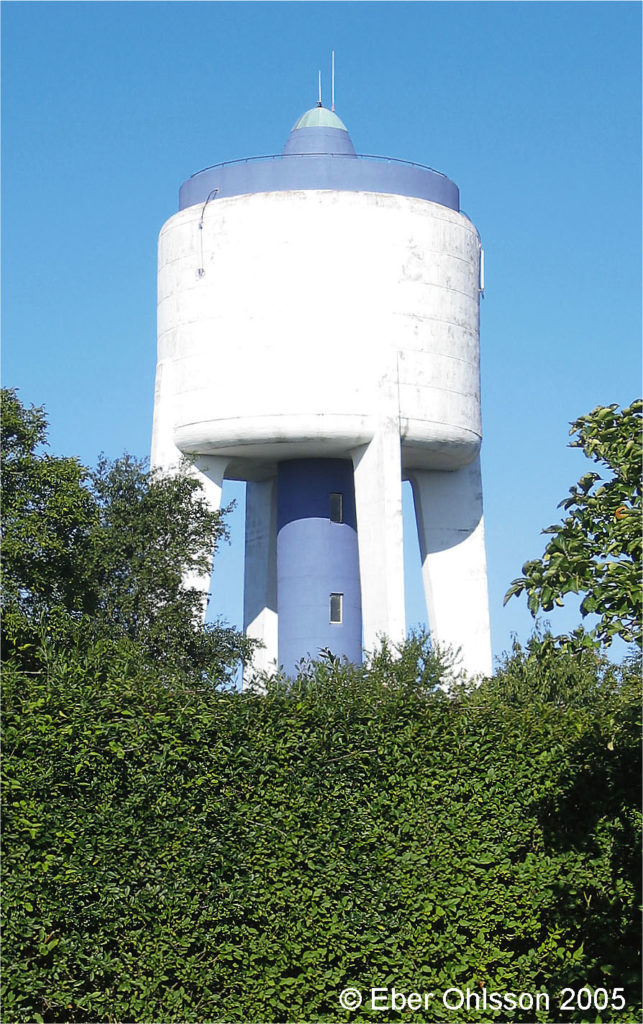
In Scanian, the word ”vann” means both ”won” and ”water”, and ”på” stand for ”on”.
In Swedish, the word ”bett” stand for both ”asked” and ”bite”. And ”folkmun” is translated to ”popular parlance”, but a direct translation should be ”peoples mouth”.
A free translation to English:
Buildings get sometimes popular epithet, something that even can applies on water towers, as one of the towers of Danish Korsør with the popular parlance epithet The Molar. The water tower is the result of an architectural competition in 1947, which was won by E Frandsen and J Falster. They ”vann på vann”, as a Scanian would have said. The 30 meter high tower of reinforced concrete can hold 450 m³.
Teeth, dental status and caries were otherwise something widely discussed 50 years ago. There were proposals to add fluoride to drinking water. But there were protests, no one had asked for this general medication. Citizens have nevertheless a good bite without prostheses.
Published 2013-12-11
Eber’s water towers in Cirkulation 8/2012
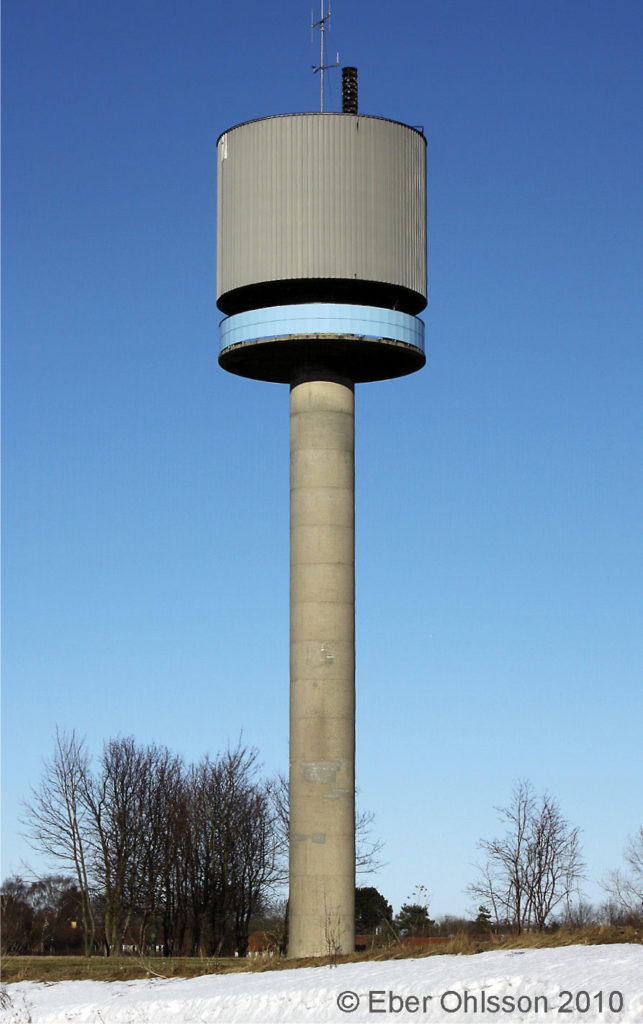
A free translation to English:
The Nobel Prize Winner Nils Bohr was one of those who were behind the founding of the Research Center Risø, north of the Danish city of Roskilde, where research of a peaceful use of nuclear power would take place. In order to cool down the reactors require water and this water shall have safe and quick access with one of the laws of physics, the law of gravity.
Therefore, it was built 1959 a 45 meter high water tower on the ground above the Risø, with a cooling reservoir of 300 m³. The tower was designed by Preben Hansen and Paul Niepoort. Since the last reactor at Risø was closed a few years ago, the tower ceased operation.
Published 2012-12-12
Eber’s water towers in Cirkulation 8/2011
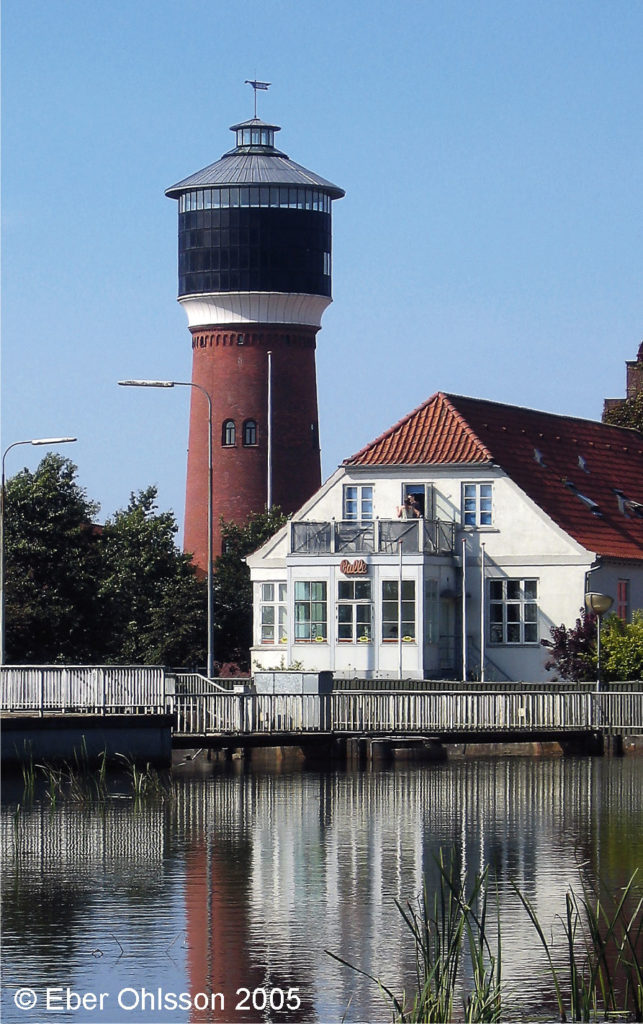
A free translation to English:
In 1902 it was built a water tower in the German town Tondern, that was situated in the then Schleswig-Holstein. The 39 meter high brick tower, with a reservoir of 200 m³, the upper corbelling part was covered by slates. When Denmark 1920 regained Nordslesvig [Northern Schleswig], now called Sønderjylland [Southern Jutland], the town was changed name to Tønder.
After the tower ceased operation 1980, it was after a donation 1994 renovated, with the upper part was lift down, rebuilt and replaced. In the now 40 meter high tower with a prospect over the salt marches, it is a permanent exhibition of chairs designed the town’s son, the famous furniture designer Hans Wegner.
Published 2011-12-14
Eber’s water towers in Cirkulation 8/2010
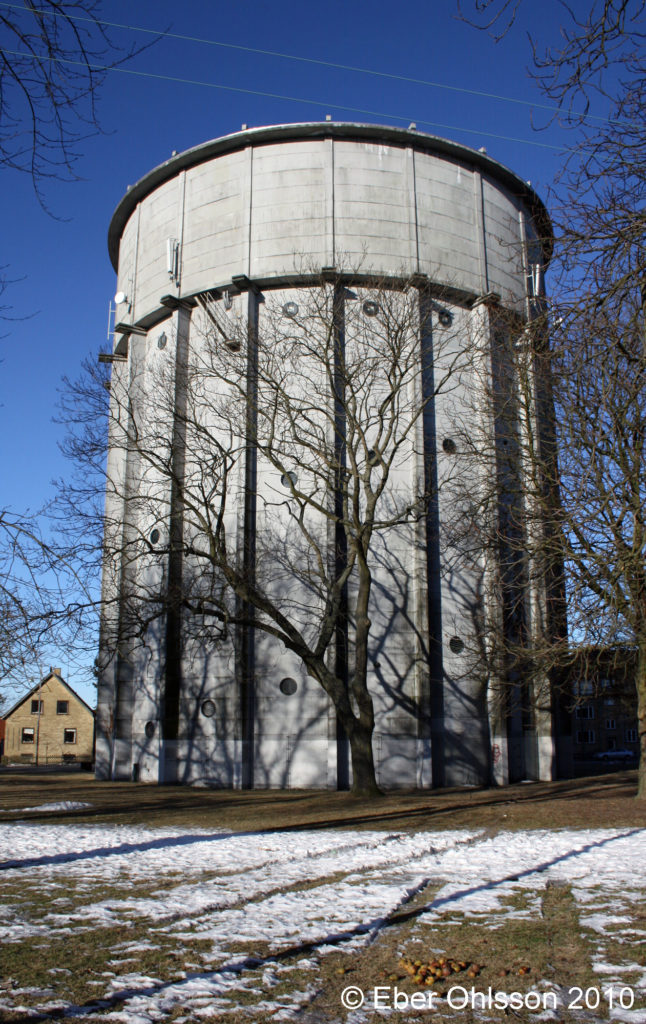
A free translation to English:
Architect Ib Lunding was a versatile talent, something he had the opportunity to practice in the city architect office in Copenhagen. He designed for example, the city’s new trolley buses and trams, with its corners rounded windows.
His hallmark, round windows, also set their mark on it by him designed 34 meters high concrete water tower in the district Brønshøj. The tower that was built in 1928, has a reservoir of 3 000 m³. On the street past the tower went tram line 2, where his trams rolled the years 1931-69, why two of his design works has been met here. The water tower is since 2000 conservation protected.
Published 2010-12-15
Eber’s water towers in Cirkulation 8/2009
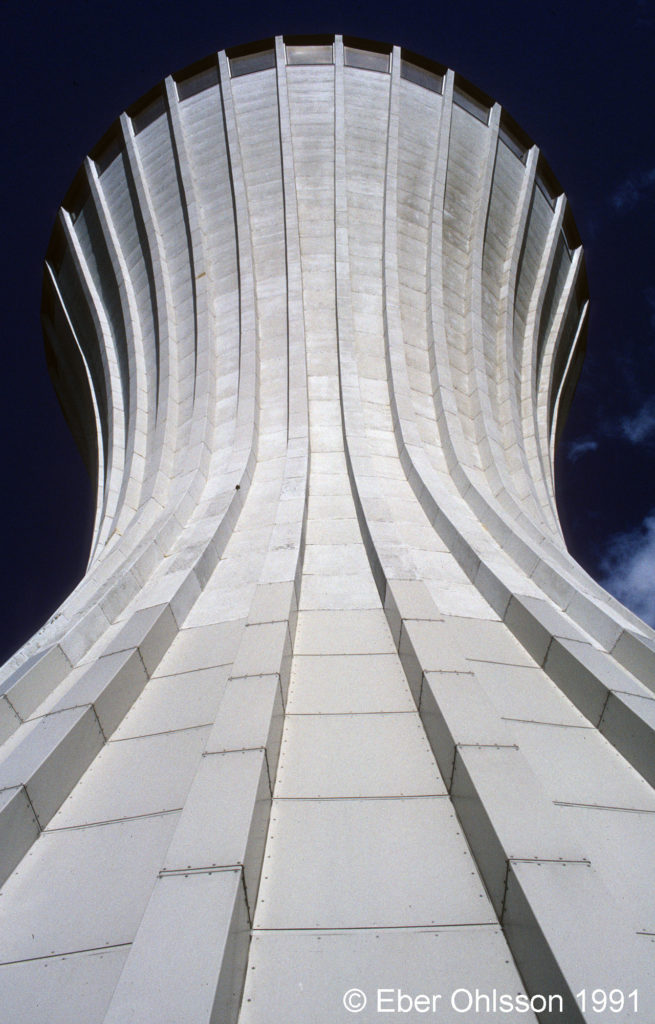
A free translation to English:
It will easy happen when the future looks light; to spend more on a new building than what should have been done in a hard time. The new water tower shall perhaps shine a little more than the tower in the neighbouring town. When the Jutland town Kolding in the 1960s should built a new water tower in the east part of the town, was Denmark in such light period.
The new water tower of Kolding that stood ready 1967, got in spite of it was more expensive, an outside steel skeleton covered with light metal plates. It was architect Henning Noes-Pedersen that draw the 42 meter high tower with the volume 750 m³. It became a shining tower.
Published 2009-12-16
Eber’s water towers in Cirkulation 8/2008
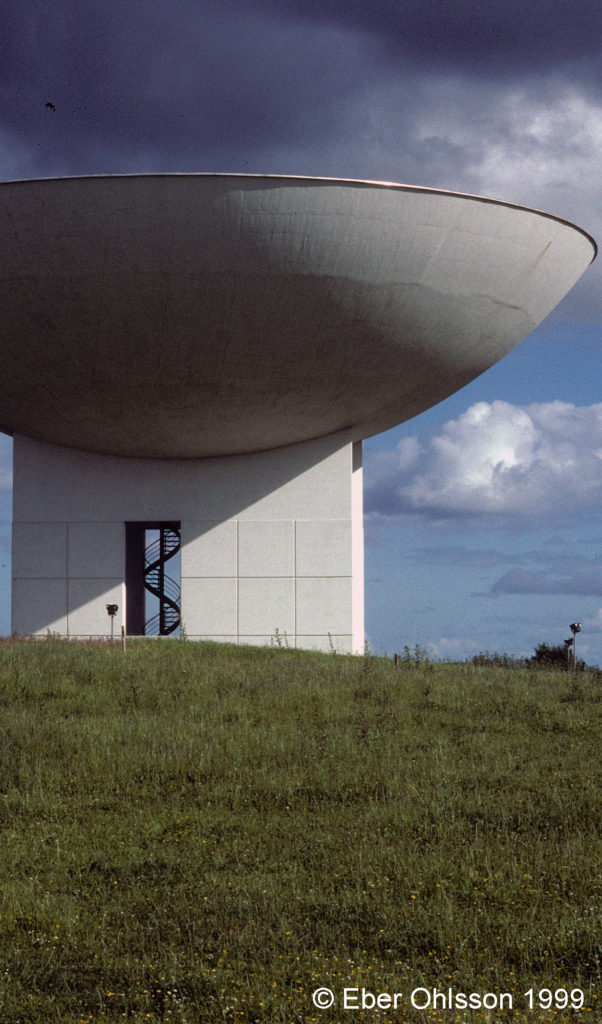
The Swedish word ”skål” stand for both ”bowl” and ”toast”.
A free translation to English :
A bowl open to the heaven can both symbolize that we gratefully receive the from above coming life-giving liquid, and that this liquid is bringing to the citizens. A pantry of the water that always is available with quality articles. In Haderslev, a town in the Danish South Jutland, was there built a concrete water tower 1991-92, that very much visualize this.
Architect Wolfgang Kleemann has here shaped a water tower as a bowl, standing on two plates. The tower has a diameter of 32 m and a height of 18 m, and has been given the volume of 3 300 m³. It became a tower with plain and distinct lines. Bowl for the water/Toast to the water.
Published 2009-12-10
Eber’s water towers in Cirkulation 8/2007
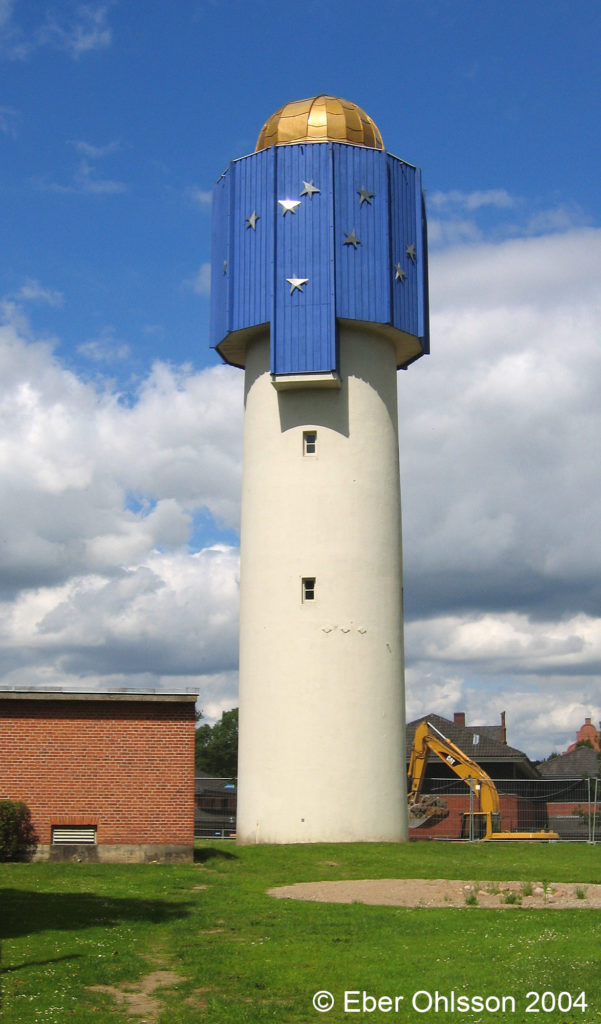
A free translation to English:
Herlufsholm in Denmark was a medieval Benedictine monastery that 1565 was transformed to a boarding school, there preferably the Danish noblesse sent there boys. As many other independent enclaves, was part of the infrastructure even here regulated inside the institute, as the water tower of the school from 1911.
As a pretentious star school there it even here an astronomic observatory. It was built on the top of a pump house; there the water was taken from the small river. When this building was demolished, the new observatory was 1970/71 located to the roof of the water tower. The pupils could then again sight towards the stars.
Published 2007-12-12
Eber’s water towers in Cirkulation 8/2006
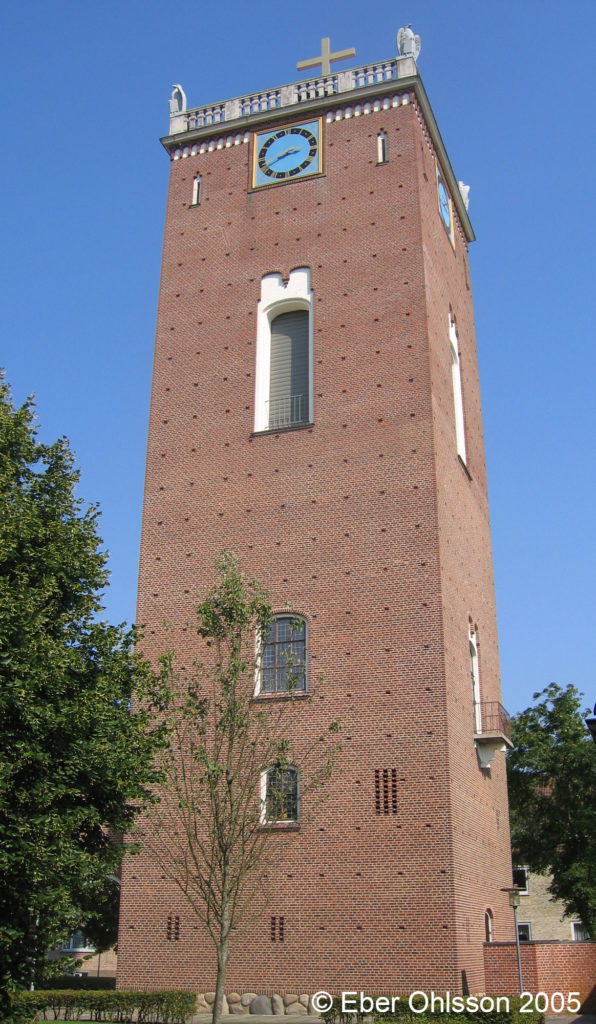
Småland is a region in Sweden, north of Scania.
A free translation to English:
The Western Jutland is a region in Denmark with lean soil, which has created rough conditions for the inhabitants. It has forced them to both economic and enterprising spirit. The similarity with the Småland is obvious, both when it concern the economic and the religious conditions.
The economy virtue came to an expression 1950, when Herning, a metropolis in the moor land, should build a new water tower, but even a new church. The potential of the savings was obvious if the water tower and the church tower could be combined. The tower of the church Saint John, designed by Öllegaard and Packness, contain therefore today a water reservoir of 400 m³.
Published 2006-12-13
Eber’s water towers in Cirkulation 8/2005
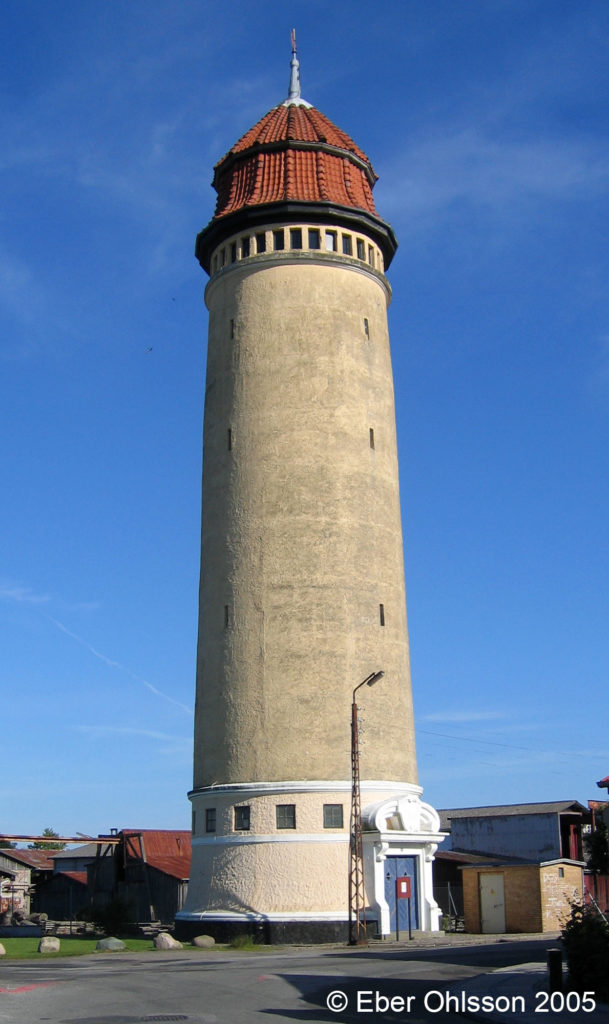
Lolland is an island in Denmark.
A free translation to English:
In the southernmost and smallest town in Denmark, Nysted in Lolland was 1912-13 a 35 meter high water tower with a reservoir on 94 m³ erected. The yellow plastered weakly conical concrete tower with white cornices, an entrance in new baroque and a red sixteen side mansard roof of tiles, was designed by architect Alf. Jørgensen and engineer Georg Jochumsen.
The tower that was in duty until 1976 was renovated 1977 and 1988. Thereafter house it exhibitions and give visitors possibility to walk up and admire the view under the summer months. It became the sixth water tower that was declared as a monument.
Published 2005-12-07
Eber’s water towers in Cirkulation 8/2004
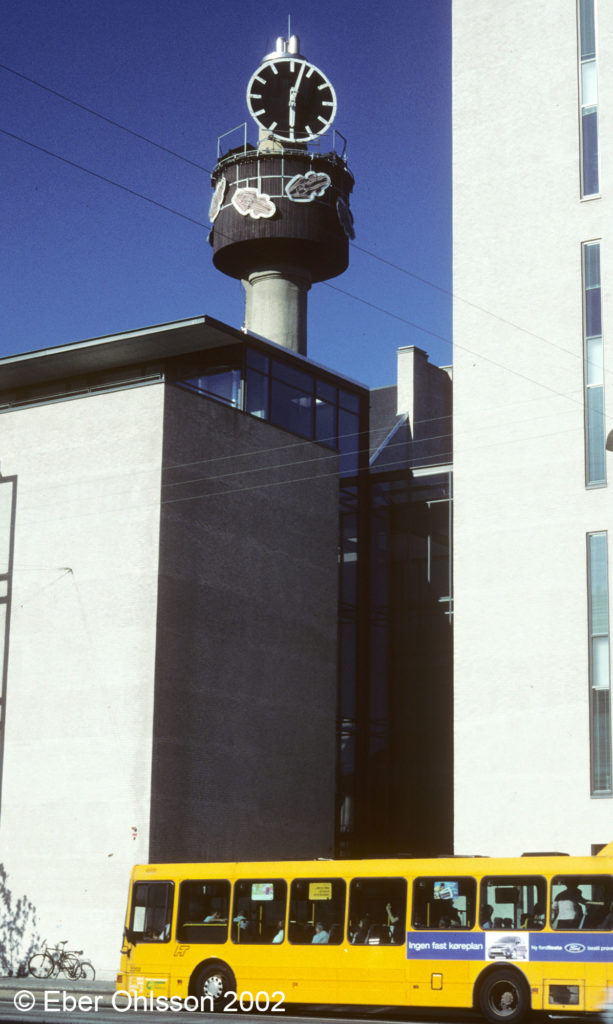
A free translation to English:
Frogs and water belongs together, but not in water towers. At the Lyngbyvej in Copenhagen, Denmark is it possible to see twinkle frogs outside the water tower, here as an illuminated advertising. It is a chimney water tower for the confectioner manufacturer of sweets, Galle & Jessen. The 50 m³ large reservoir from 1927 was putting up because the consumption was so large that the municipality main system not at all time could supply the needed water quantity.
The factory was moved 1988, but the water tower was still standing and was protected from 1998 and 10 years ahead. Therefore are there still advertise for one of the company’s great products – chocolate frogs.
Published 2004-12-08
Eber’s water towers in Cirkulation 8/2003
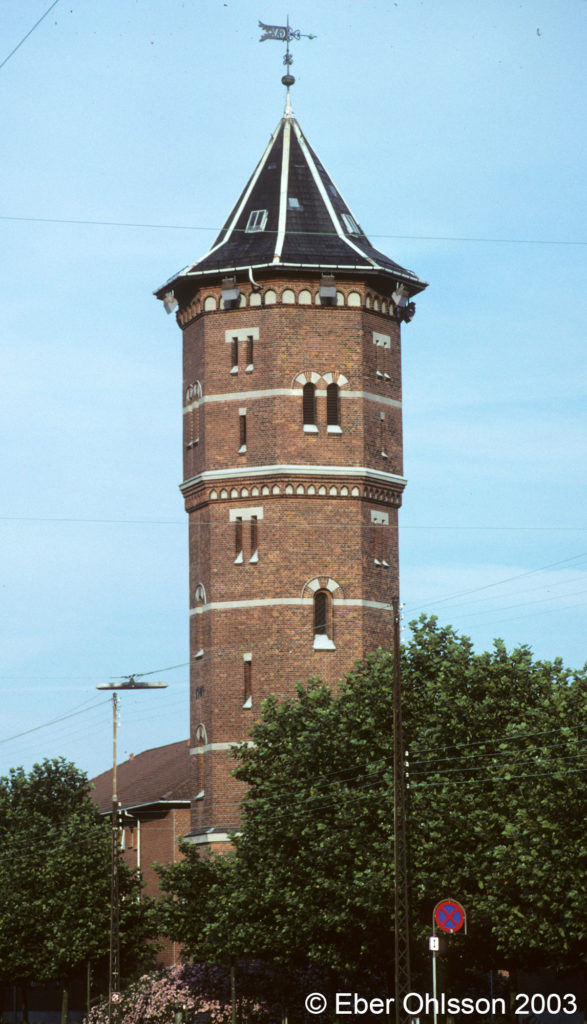
A free translation to English:
The out-punch ”G.V.” on the water tower vane in the Danish Glostrup, is a proud marking that the suburb municipality in the western Copenhagen is a modern society with its own water work. The 33 meter high water tower in brick, with a reservoir on 110 m³, was built 1905 in Romanesque style under the glory period of Art Nouveau, after drawings and calculations by engineer August Fensmark.
The tower was in duty until 1963, when it was replaced by a new and larger water tower. The proposal to tear down the water tower and built a filling station come to naught, so today is the old water tower protected as the mark of Glostrup.
Published 2003-12-17
Eber’s water towers in Cirkulation 8/2002
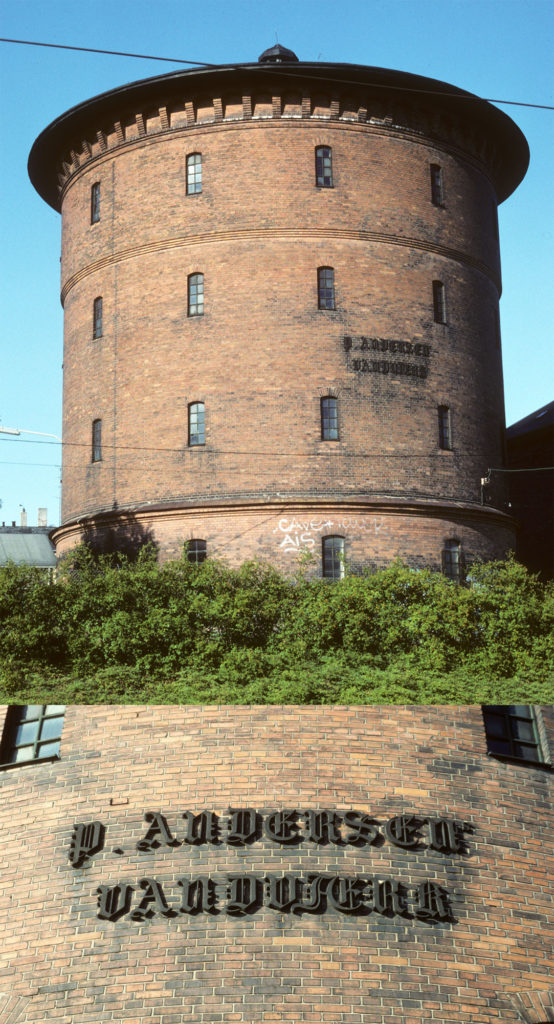
The writer has a son-name…, Swedish=son, Danish=sen.
A free translation to English:
Peder Andersen was a factory owner that lived and worked in Frederiksberg in the 1800s, a municipality surrounded by the Danish capital. He arranged 1869 a private water supply in the east part of his home municipality, and built at that time a water tower on his own ground.
The year 1877 he repeated the achievement by further westbound built a new water work and water tower, at P Andersens Vej [P Andersen road]. The tower, with a reservoir on circa 500 m³ that is carried by cross-pillars, was out of duty 1948 and is since 1990 a historic building. Even today is the name Andersen standing on the water tower, a beautiful memory that perhaps even should fit other son-names…
Published 2002-12-11
Eber’s water towers in Cirkulation 1/2002
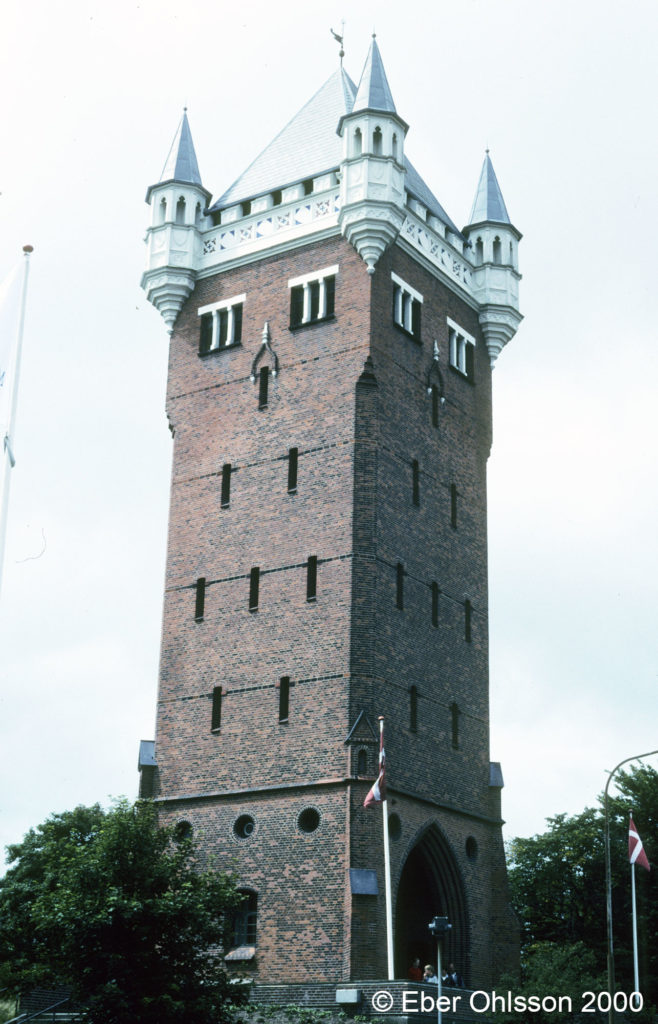
The English expression ”in the gravy” has a comparing Swedish expression (translated) ”in the butter”.
A free translation to English:
Illustrate margarine packets with water towers is not usually, but has been applied by the Esbjerg Margarinefabrik [Esbjerg Margarine factory]. It is a trick that is intelligible, because a trade market shall be distinctive and besides that connected to positive values. What can in that case be more suitable than a magnificent water tower and besides that the mark of the Danish town.
Architect for the since 1897 on a hill, also a Bronze Age hill, standing western Jutland tower, with its characteristic tourelles, was Christian Hjerrild Clausen. He had in all probability the Medieval Haus Nassaau in Nuremberg as a model. The cylindrical reservoir of the tower is holding only 130 m³, which early was too little in the expansive export port town.
The tower that since long time is out of operation, got at ten years ago a solid repair work, and has today summer exhibitions with tower view. The tower that is a historic building and has its own association, is so to say, in the gravy.
Published 2002-02-13
Eber’s water towers in Cirkulation 4/2000
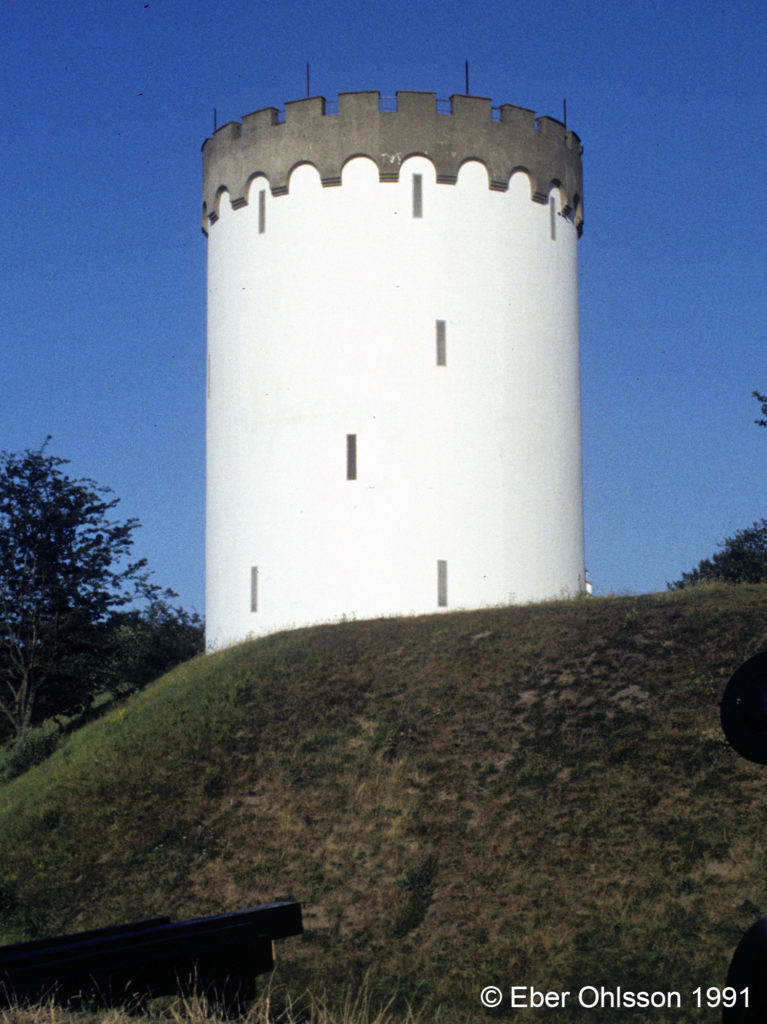
The Swedish expression ”Förvara och försvara” will translated to English be ”Keep and defend”.
A free translation to English:
Keep and defend. It is words that can be used on the water tower in the Jutland town Fredericia. The town, that celebrates the 350th anniversary this year [2000], has one of the best preserved town-fortification in Scandinavia. On the top on one of the bastions, Prince George Bastion is a white water tower standing since 1909. It was moreover the same year that the Bastion Fredericia was discontinued.
The tower is 16 metres high and has on the top crenulations that allude to a medieval defence tower. It was entrepreneur Gudnitz from Copenhagen that for 24 500 Danish crowns built the water tower in reinforced concrete.
Above the reservoir on 440 m³ is there a belvedere that is open to the public under the summer season. From here is it a brilliant view over Danish waters, not least the Little Belt. The tower will defend its place.
Published 2000-06-07
Eber’s water towers in Cirkulation 1/2000
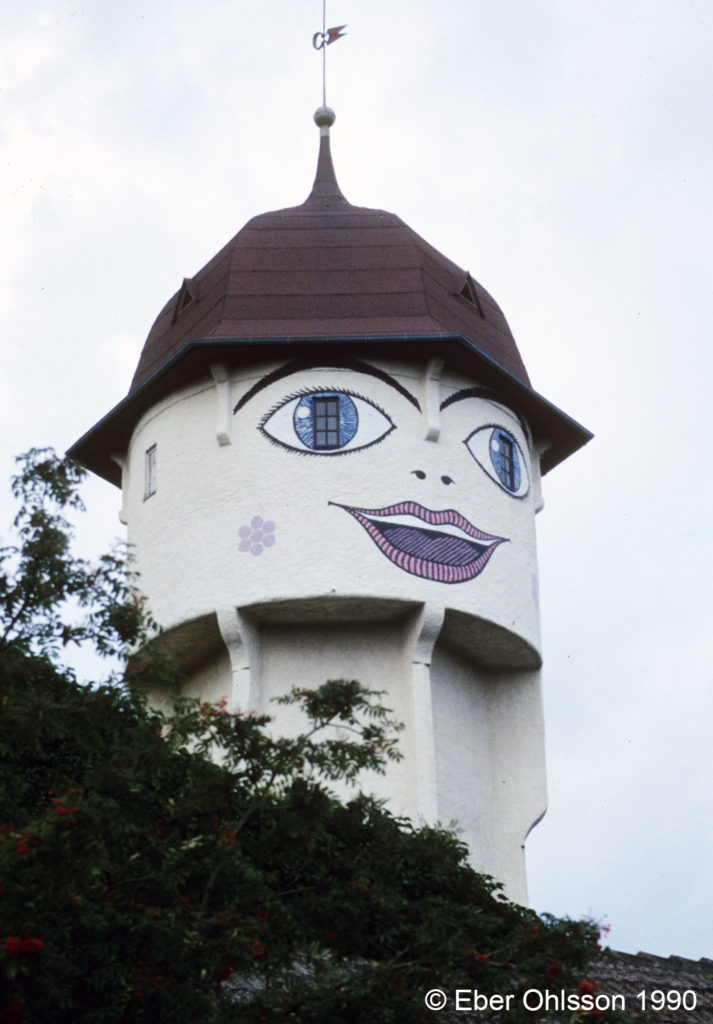
The Swedish expression, that even is ambiguous (translated) ”make a snip” has a comparing expression in English ”make a good bargain”.
A free translation to English:
In the small Danish town Sakskøbing on Lolland was there built a 33 metres high water tower 1908. The reservoir volume was not overwhelming, only 60 m³. A common Danish water tower in other words. The only distinctive character was the vane in form of a sheep shears, an allusion on the town’s the coat of arms. The big change came when architect Fleming Skude draw a proposal to paint the tower.
The year 1982 was the face at the reservoir painted, with two windows on the tower as eyes and the roof as a naturally hat. The tower was out of operation 1985, but is today the town’s face against the world around and will be found on signs and brochures. ”Saxine – the smiling water tower” was a face lifting and a real good bargain of the town.
Published 2000-02-16
Eber’s water towers in Cirkulation 8/1998
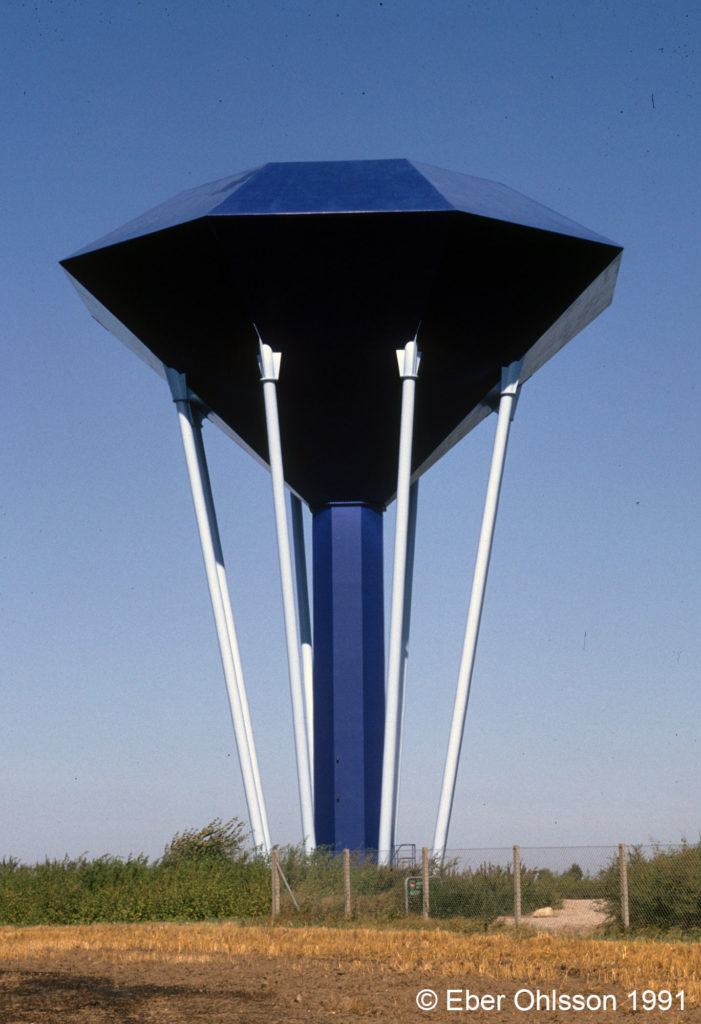
A free translation to English:
A water tower of steel that differ from the normal standardized and total dominating rotation symmetric form can you find in the Danish town Horsens. Here in the south suburb Tyrsted has the architect Holger K Nielsen create a water tower in 206 metric ton steel with a consciousness sculptural form. A hydraulic good form, there the advantage of the steel is used.
Above the octagonal centre column and the eight in fan-shaped placed side pillars is there a reservoir, shaped as a cut diamond. As for the very much small transparent diamond, bring the light here plus values. Light reflections and shadows shift on the sixteen reservoir sides with the suns walk over the vault of heaven.
It is not surprising that the water tower got ”The European Steel Prize”, the building year 1983. Behind the blue-painted faces of steel is there 2 000 m³, and this to a building cost for the whole tower on 3.6 millions Danish Crowns. The 28 meter high water tower in the East Jutland has rightly got the epithet ”The Blue Diamond”, and certainly is it a beautiful piece of jewellery in the town of Horsens.
Published 1998-12-09
Eber’s water towers in Cirkulation 3/1998
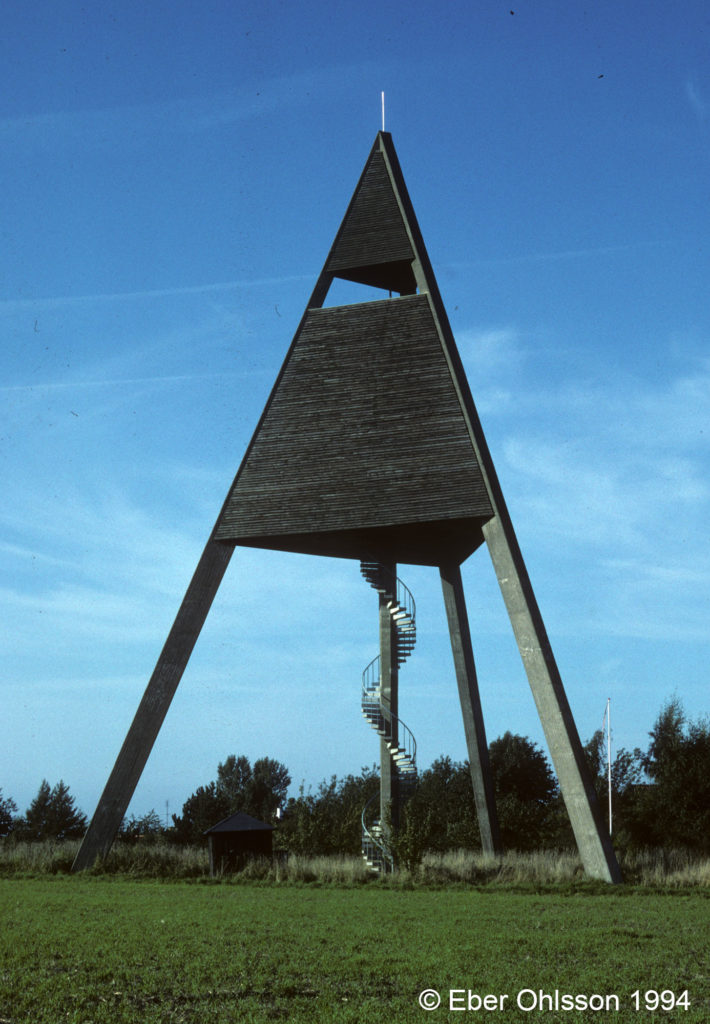
A free translation to English:
An individual water tower, by a world-famous architect, you will find on the east coast of Bornholm. In the idyllic place Svaneke stand a water tower, that is called the navigation mark. The name-giving is easy to understand, but not the water technical form. The dram glass form had probably been better, even in Denmark. The pyramid form is perhaps the price you must pay, when the unconventional architect Jörn Utzon design water towers.
Some years later he created another individual building, the famous Sydney Opera in Australia. The Svaneke citizen is pride of the water tower they got 1952. With a reservoir volume of 110 m³, it solved the support until 1988. Now is it out of operation and declared as a historic building.
Published 1998-04-29
